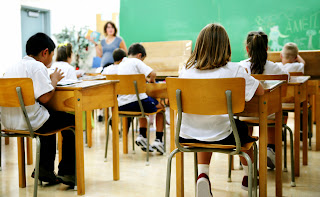What Comes after Spanish Community Service Learning?
 |
| We need people who can negotiate among languages, national cultures, subcultures and school cultures. |
Two educational situations in particular seem to evoke strong reactions from my Spanish community service learning students:
- Students who have worked in a bilingual classroom throughout the semester are shocked by what happens when the class has a substitute teacher who does not speak Spanish. Gradually, over the course of the semester, my students become accustomed to a classroom atmosphere in which learning took place in Spanish or both Spanish and English. Then all of a sudden, one day, with a monolingual English-speaking substitute teacher, they see the learning and classroom discipline come to a screeching halt. My students often jump in and play very important roles in those situations, surprising even themselves at how much they can contribute.
- Students who have done their community service learning work in a school or with any other type of community partner organization are pleasantly surprised by how important their roles as interpreters are during parent-teacher conferences at Central High School. They suddenly see how important the role of parents are in the children's education and how that is compromised when parents and teachers cannot communicate because of linguistic barriers.
But then what?
Students become aware of important issues. They witness their own capacity to provide access to linguistically and culturally appropriate services. The negative consequences of not having those services becomes readily apparent. Then they finish the semester. Graduate. Look for jobs. Move on with their lives.
We can do a better job of letting students know about opportunities to continue being a linguistic and cultural "bridge" to Spanish-speakers in the U.S.
My friend and colleague, Prof. Soria Colomer, sent me this information about a very interesting short course: The University of Georgia’s Professional Interpreter in Education Certificate Program. In addition to being a valuable course in and of itself, I really like the idea of providing language and cultures training to current students as well as practicing professionals in smaller "chunks" than the typical 15-week on-campus semester.
Students, take a look at the program. Even if you can't go to the University of Georgia, use this as a beginning to search for similar opportunities closer to you or in your own professional area if you're not involved with education.



Comments
Post a Comment